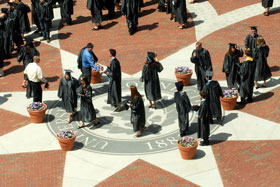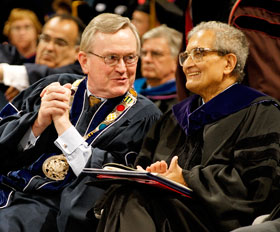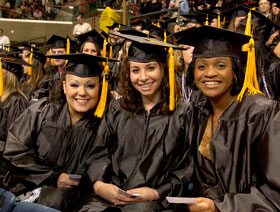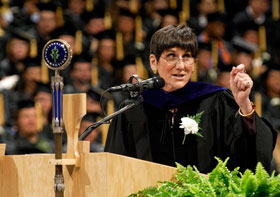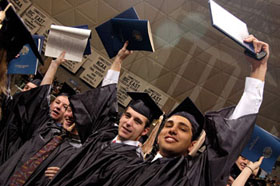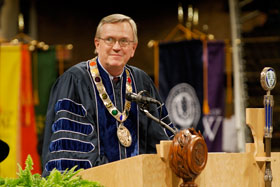  |
| HOME | THIS ISSUE | CALENDAR | GRANTS | BACK ISSUES | < BACK | NEXT > |
Graduates responsible to build better world, speakers sayby Kenneth Best & Elizabeth Omara-Otunnu - May 15, 2006
|
||||||||||||||||||
|
As a student-athlete, Leah Williams is used to balancing a busy schedule as a pole vaulter for the UConn women’s track and field team with her class work.
So she took it in stride on the bright sun-splashed day that greeted the largest undergraduate commencement ceremony in UConn’s 125-year history, that she would first have to compete in the Big East Track & Field Championships at the Sherman Family Sports Complex before rushing into Gampel Pavilion in time to receive her degree in coaching and administration from the Neag School of Education. Williams was one of 4,380 students to receive bachelor’s degrees during ceremonies that also included the conferral of honorary Doctor of Humane Letters degrees to best-selling author Barbara Ehrenreich and business executives and philanthropists David and Rhoda Chase, an honorary Doctor of Laws degree to U.S. Rep. Rosa L. DeLauro of New Haven. Provost Peter J. Nicholls presented this year’s University Teaching Fellows: John DeWolf, professor of civil and environmental engineering; Thomas Miller, professor of health promotion and allied health sciences; Jaci Van Heest, associate professor of kinesiology; and C. Michael White, associate professor of pharmacy practice. The theme of this year’s Commencement ceremonies was graduates’ responsibility to build a better world. “You enter a world shaped by acts of terror, religious and ethnic conflict, breathtaking economic change, and technological advances that may bode good or ill,” University President Philip E. Austin told the graduands in his Commencement message. “It will be for you, each in your own individual way, to try to build a better, more just, more peaceful society.” DeLauro addressed the Class of 2006, urging graduands to accept the challenges facing the United States today and accept the responsibility of helping find solutions to rebuild the institutions upon which the nation grew, including government, the media, and businesses. “I ask you to turn off your iPods for a moment and think about the stake you have in the challenges that we face,” DeLauro said. “I ask you not to simply accept that responsibility but to embrace it with that uniquely American spirit that affirms our belief that even in an environment of mistrust and indifference, big solutions are possible.” Outlining a variety of topical issues facing the nation – including dependence on oil for energy, escalating health care costs, and the ongoing threat of terrorism after Sept. 11, 2001 – DeLauro said finding solutions to national problems will require the participation of all citizens. “Whatever your path in life, leave room to participate – to help us pursue goals rooted in the common good,” she said. “Regardless of whether the solution takes place in the public or private sectors, at the grassroots or in the corporate boardrooms, on your turf or theirs, help us transcend our differences.” DeLauro also noted UConn’s growth over its 125-year history, from a faculty of three in 1881 to its 21st-century “renaissance as one of America’s premier institutions of higher learning.” “This is a school that attracts the best – including dozens of our state’s high school valedictorians,” she said, “but more importantly it produces the best.” While her remarks focused on serious issues of the day, DeLauro also paused periodically to inject some humor into her remarks, such as noting the brightly colored beach balls that bounced among the students. She also offered some personal history. “I always wanted to be a tap dancer,” she said, moving around the podium. “And although I never told my mother this, I once worked as a go-go dancer. She wanted me to succeed in something like law or as a doctor. Thank you for this honorary doctor of laws. Now I can tell her I am both.” During the graduate ceremony May 6, Harvard economist and philosopher Amartya Sen focused on global issues. He warned graduands that they would find the world beyond academia “in a bit of a mess.” “The world in which we live is both remarkably comfortable and thoroughly miserable,” he said, noting that there is “unprecedented prosperity” but also “extraordinary deprivation” and “astonishing inequality.”
These disparities, he said, are not unconnected to the increasing problem of global violence, including ethnic genocide and systematic acts of terrorism. Referring to the problem of terrorism, he said, “Global grievance and even the memory of past injustice can be exploited to make normal human beings mad enough to kill other people who are seen as being somehow tainted by these past sins.” Another factor feeding terrorism, he said, is a narrowly defined sense of identity. “A strong – and exclusive – sense of belonging to one group can go with the perception of distance and divergence from other groups,” Sen said. Individuals belong to many different groups and have multiple identities that shape their behavior and priorities in particular circumstances. Yet “the world is increasingly seen … as a collectivity of religions …, thereby ignoring all the other ways in which human beings can see themselves.” “Islamic terrorists draw on the cultivation of a singular identity,” he said, yet Arab civilization has made many important contributions to global culture. For example, “When a modern mathematician in America or Europe or Japan invokes an ‘algorithm’ to solve a difficult computational problem,” Sen observed, “she may not realize she is commemorating the contributions of the ninth-century Muslim mathematician Al-Khwarizmi, from whose name the term algorithm is derived.” Yet science and mathematics have tended to be ascribed to “Western science,” he said, “leaving other civilizations to mine their pride in religious depths.” Sen appealed to the graduands to draw on their education to resist narrow classifications that “generate unnecessary distance.” “The thesis of Western exceptionalism is not only intellectually weak,” he said, “it also contributes greatly to the dialectics of confrontations that go with it.” During the graduate ceremony, bioethicist Arthur Caplan received an honorary Doctor of Science degree, and Sen received an honorary Doctor of Laws. Sen, a Nobel Prize-winner in economics, joked, “We honorary graduands actually ‘free ride’ on the work and achievement of the real graduands. It’s to record and celebrate your success that the University has to have a commencement, and … they have to have some elderly people to make sure that it does not look like a youth fair or … a Woodstock.” John Davis, the Emiliana P. Noether Chair of Modern Italian History, and William Kraemer, a professor of kinesiology with joint appointments in physiology and neurobiology and medicine, were recognized as University Research Fellows. Janine Caira, a professor of ecology and evolutionary biology; Joel Kupperman, a professor of philosophy; and Sally Reis Renzulli, a professor of educational psychology, were honored as Board of Trustees Distinguished Professors. The awarding of degrees began with the presentation of a posthumous Ph.D. in business administration to the family of the late Sylvia Santiago, an accounting student who died unexpectedly as she was completing her dissertation. The next graduand was Jessica Amy Goldstein, who earned a Ph.D. in educational psychology. “The Graduate School tries to be fair and take students in alphabetical order,” said Gregory Anderson, interim vice provost for research and graduate education, “but one student is close to finishing something else: her pregnancy.” Goldstein was having contractions during the ceremony. Acting University Marshal Keith Barker noted that this year’s group of doctoral recipients was the largest to participate in a Commencement ceremony at UConn. An estimated 165 doctoral degree (including Doctor of Pharmacy, Audiology, and Musical Arts as well as Philosophy) recipients and candidates took part in the ceremony. The total number of those who completed doctoral degrees in the past year is even higher, as many degree recipients are not able to attend the ceremony. More than 700 students were awarded various master’s degrees, and 43 received a professional diploma in education. |
| ADVANCE HOME UCONN HOME |

